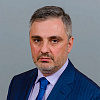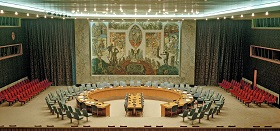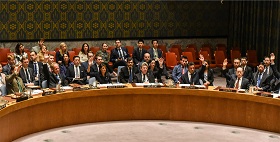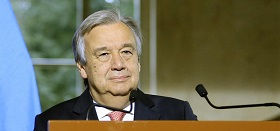In recent years, several countries have stepped up their efforts to reform the UN Security Council in terms of its membership and operating methods, and have been pushing for a redistribution of powers among the Security Council and the General Assembly in favour of the latter.
In this respect, France is trying to promote the “Code of Conduct” initiative it put forward back in 2013 on the need for the five permanent members of the Security Council to voluntarily refuse to use their right to veto in cases where “mass crimes” have been committed.
African nations call for the UN Security Council to be increased to 26 members, with five non-permanent and two permanent seats being given to countries from this group. What is more, the two new permanent members should be imbued with the same powers as the current five permanent members, including the right to veto.
Earlier, the so-called “Group of Four” published a draft resolution of the UN General Assembly as part of the discussion on reforming the Security Council initiated by former Secretary-General of the United Nations Kofi Annan back in 2005, which proposed expanding Security Council membership to 25 that very same year.
As far as Russia is concerned, the number of Security Council members should be in the “low twenties,” which runs counter to the much-publicized proposals made by certain delegations and groups of countries to increase membership to 25 or 26.
The decision to extend the mandate of the Organisation for the Prohibition of Chemical Weapons (OPCW) on June 27, 2018, giving the Technical Secretariat the power to identify those responsible for using chemical weapons in Syria, served as a wake-up call in the context of the lengthy discussion on the need to reform the UN Security Council. Investing the OPCW with prosecutorial powers sets a precedent in the post-war period and is aimed at duplicating the Security Council’s functions. Clearly inspired by the decision, some countries have stepped up their efforts to reform the UN Security Council in terms of its membership and operating methods, and have been pushing for a redistribution of powers among the Security Council and the General Assembly in favour of the latter.
Mission Impossible?
The repeated use of the right to veto by Russia in connection with the Syrian crisis and by the Trump Administration [1] in connection with Palestine during voting at the UN Security Council on draft resolutions that would go against their national interests has once again stirred up the discussion on the need to reform the operating methods and membership of the Security Council.
Clearly, France will take advantage of the situation to promote the “Code of Conduct” initiative it put forward back in 2013 on the need for the five permanent members of the Security Council to voluntarily refuse to use their right to veto in cases where “mass crimes” have been committed. According to some estimates, 114 countries have already put their name to the initiative, although this is still shy of the two-thirds (128 votes) of the UN member states required to pass such an important decision. At the same time, France, along with all the countries that share its ideas, should bear in mind that three out of the five Security Council’s permanent members – Russia, China and the United States – have rarely displayed unanimity on the issue, refusing to discuss the proposal put forward by the French side.
The election of Germany as a non-permanent member of the UN Security Council for 2019–2020 gives Berlin yet another opportunity to make some noise about the urgent need to expand the Council’s membership and put forward its case for becoming a permanent member within it – both as a country in its own right and as a representative of the so-called “Group of Four” that also includes Brazil, India and Japan.
Back in 2005, the Group of Four published a draft resolution of the UN General Assembly as part of the discussion on reforming the Security Council initiated by former Secretary-General of the United Nations Kofi Annan, which proposed expanding Security Council membership to 25 that very same year. The project envisaged the creation of six additional permanent seats on the Council (two for Asia, two for Africa and one each for Latin America and Western Europe) and four additional non-permanent seats. The document included a provision stating that a review of the UN Security Council membership composition should be carried out 15 years after the adoption of the decision to expand it. The decision would have been considered adopted, if two thirds of the UN member countries had voted in favour of it. The next step would have been to elect the new permanent members by direct secret ballot, and the necessary amendments would then have been written into the UN Charter upon ratification by the members of parliament of two thirds of the member states, including all six permanent members of the Security Council.
The so-called “Uniting for Consensus” group emerged as a counter to the Group of Four, counting such major regional competitors to the Group of Four countries as Spain, Italy, Argentina, Pakistan and South Korea among its ranks.
Uniting for Consensus included a so-called “intermediate model” of reform in their draft resolution for the General Assembly. According to this model, the UN Security Council should be expanded to 25 members, but the additional seats should be non-permanent and for an extended term. Furthermore, these non-permanent members should be given the opportunity for immediate re-election when this term ends. The Uniting for Consensus group also called for the permanent members of the Security Council to show “restraint” when it comes to using their right to veto.
African countries instead submitted their own draft resolution to the General Assembly calling for the Security Council to be increased to 26 members, with five non-permanent and two permanent seats being given to representatives of this regional group. In addition, the draft resolution called for the new permanent members to be accorded the same prerogatives as those of the current permanent members, including the right of veto.
However, none of these three draft resolutions was put to vote at the UN General Assembly as their authors failed to secure the necessary support. There was a real threat that this most sensitive of issues might cause fracture within the United Nations. The decision was made during the 2005 World Summit to continue work on reforming the organization in the form of intergovernmental negotiations in order to find ways to bring the various positions into closer alignment.
When talking about the possibility of the current Secretary-General of the United Nations initiating a new round of reforms, it is important to remember his words in April 2018 about the Security Council being out of touch with modern realities and certain permanent members abusing the right of veto. The speech was made against the background of the worsening U.S.–Russia confrontation on the Syrian crisis. António Guterres also noted that a complete reform of the organization is impossible without first implementing changes to the work of the Security Council. Many experts interpreted these statements as supporting the French idea of restricting the right of veto, which corresponds in principle with the position adopted by Uniting for Consensus and Portugal – Guterres’ native country.
The extent to which the current Secretary-General will be able to continue to efforts of his predecessors, particularly Kofi Annan, to reform the United Nations and the Security Council before his five-year term is up (in December 2021) is unclear, as it will take an enormous amount of time and effort. Guterres has not yet stated whether or not he will be running for re-election, but it is worth mentioning that he will be 72 years old when his term in office comes to a close.
Russian Interests
Russia has always advocated for making the UN Security Council more representative in nature, while keeping it relatively compact in terms of membership in order to ensure an adequate and rapid response to contemporary challenges and threats. As far as Russia is concerned, the number of Security Council members should be in the “low twenties,” which runs counter to the much-publicized proposals made by certain delegations and groups of countries to increase membership to 25 or 26. As for modifying the working methods of the Security Council, Russia’s interests are closely tied to preserving the status quo and the prerogatives of the permanent members, including the right to veto.
Clearly, the course taken by the Russian leadership at the beginning of the 21st century to support the members of the so-called “Group of Four” – Brazil, India, Germany and Japan – in their push to be included in an expanded Security Council setup has been adjusted somewhat in response to the development of the geopolitical situation and the nature of Russia’s interaction with these states on the international stage. As Minister of Foreign Affairs of the Russian Federation Sergey Lavrov noted in May 2018, “countries such as India and Brazil are strong candidates for permanent membership in the Security Council.”
Naturally, given the fact that Berlin has slapped unilateral sanctions on Russia, and considering Germany’s “vassal” dependence on the United States, we should not expect Moscow to pledge its support for the country’s candidacy for permanent membership any time soon.
The lack of progress in the signing of a peace treaty between Russia and Japan, as well as Tokyo’s territorial claims, were largely to blame for Shinzo Abe’s ill-fated visit to Moscow in April 2013, when the Japanese Prime Minister failed to secure Russia’s support for his country’s candidacy for permanent membership in the UN Security Council.
It would be in Russia’s interests to support the candidacy of Brazil, India and South Africa (the latter has been granted the status of non-permanent member of the Security Council for 2019) – its partners in BRICS – as they all call for the comprehensive strengthening of international law. Ostensibly, BRICS could become an example for the formation of a new model of global relations that is built on top of the dividing lines of “east–west” and “north–south” and does not conform to the logic of military and political blocs.
The steps currently being taken by the West – the decision of the United States to pull out of the United Nations Human Rights Council (UNHRC) and the adoption of the decision brought forward by the United Kingdom at a special session of Conference of the States Parties to the Chemical Weapons Convention (CWC) to grant the Technical Secretariat of the Organisation for the Prohibition of Chemical Weapons (OPCW) rights beyond the scope of its jurisdiction to identify those responsible for using chemical weapons in Syria – are all aimed at eroding international legal mechanisms, and Russia should respond appropriately. In relation to this, Russia should be prepared to counter Washington’s attempts to move the discussion of the human rights agenda to the UN General Assembly and the unofficial format of the “Arria-formula” meetings of the members of the Security Council. It should also strive to ensure its own election to the UNHRcC for 2021–2023.
If the parties succeed during the upcoming regular Conference of the States Parties to the Chemical Weapons Convention in November 2018 in putting through the proposal to establish a similar investigative mechanism to provide technical assistance to other States Parties to the Convention, should they so request, in identifying the “perpetrators, organizers and sponsors” of chemical weapon use within the national territory in question, then the Russian government should immediately consider withdrawing from the OPCW altogether.
Russia should not be concerned about such a decision harming its reputation. A similar situation arose in November 2016 when Moscow refused to participate in the Rome Statute of the International Criminal Court (ICC) against the backdrop of the report published by the ICC on Crimea, in which the Hague Tribunal classified the situation on the Crimean Peninsula and in Donbass as a military conflict between Russia and Ukraine. What is more, unlike the United States, Russia has successfully dismantled its own arsenal of chemical weapons (in November 2017), which has been confirmed by the OPCW.
At the same time, it would be wise to use the significant financial resources that have been unfrozen to pay Russia’s contributions to the UN regular budget, and in the medium term increase its share in the budget from the current 3.088 per cent to at least 10 per cent of the total volume [2], which would certainly help boost Russia’s influence within the organization.
1. GUnder the Obama Administration, the United States abstained from the vote on Security Council Resolution 2334 held on February 23, 2016, thus indirectly condemning Israel for establishing settlements on Palestinian territory.
2. In 1990–1991, the USSR’s contributions to the UN regular budget (not including the Byelorussian or Ukrainian Soviet Socialist Republics) amounted to 9.99 per cent of the total amount.








